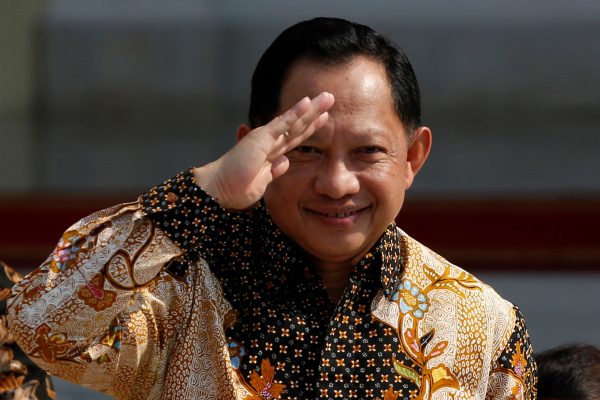Jokowi’s inaugural term saw enhanced powers for Indonesia’s bureaucracy to regulate civil society on national security grounds. Regulation in Lieu of Statute (Perppu) No. 2 of 2017 amends the 2013 Civil Society Law to empower the Minister of Home Affairs or the Minister of Law and Human Rights to sanction civil society organisations (CSOs) ‘whose principles and activities threaten the sovereignty of the Unitary Republic based on Pancasila’ (the five foundational principles of the Indonesian state). This regulation allows ministerial revocation of CSO registration without issuing notice or allowing groups judicial recourse to contest the government.
Law and Human Rights Minister Yasonna Laoly, a civilian in his second term, first used the regulation in 2017 to revoke the registration of Hizbut Tahrir Indonesia (HTI) for violating Pancasila through promoting the creation of a caliphate. HTI attempted to appeal the decision, but both the Jakarta State Administrative Court and the Supreme Court rejected their petition.
In addition to revoking licenses and forcing CSOs to disband, Laoly drafted and advocated controversial revisions to Indonesia’s criminal code, sparking protests and riots in September 2019. Laoly continues to defend the bill, insisting that controversial articles will not be removed but their language may be revised.
Meanwhile, former National Police (POLRI) chief Tito Karnavian is Indonesia’s new Home Affairs Minister. As head of POLRI, Karnavian supported Laoly’s HTI ban and the investigations for possible sanction of similarly anti-Pancasila CSOs.
Karnavian’s policy priorities align with Jokowi’s platform on infrastructure, growth and foreign investment, but he’s also set to expand counter-terror and domestic security policy. Shortly after his confirmation as minister, Karnavian stated that there are 18 CSOs suspected of spreading radicalism in 15 provinces, as evidenced by their by-laws, finances and activities. Karnavian’s injunction against extortion (premanisme) in Bekasi shows that the crackdown will not necessarily be limited to religious radical groups.
While no longer the country’s leading law enforcement officer, Karnavian will play a key role in policy formulation. And he looks prepared to use the office as a cudgel to discipline CSOs who run afoul of the administration. For example, Karnavian is considering rejecting the infamous Islamic Defenders Front’s CSO license renewal, stating that he is waiting for advice from the new Minister of Religious Affairs Fachrul Razi, previously deputy commander of the Indonesian military.
Razi’s appointment is also both historic and controversial as it marks the first time a general and non-clerical official has been appointed to this position in the post-Suharto era. Razi appears to equate outward expressions of religious piety with radicalism and prompted public outcry when he openly considered banning the niqab (face veil) in government facilities, citing security concerns. He has promoted Pancasila training for preachers as a remedy for radicalism.
Karnavian and Laoly are likely to follow Razi’s lead in using the fight against radicalism and promotion of Pancasila to place constraints on civil politics. During his state of the nation address in August 2019, Jokowi pledged Pancasila to combat the intrusion of dangerous ideologies that radicalise ordinary citizens and politicians alike. Other members of cabinet, including Prabowo Subianto, the controversial new Minister of National Defense, and Moeldoko, the President’s Chief of Staff, among others, have echoed Pancasila to justify the counterterrorism approaches of their ministries. Jokowi’s cabinet aligns its ambitions to effectively regulate civic and associational life with the President’s stated priorities.
But regardless of justification, associational restrictions are unlikely to be effective against Indonesia’s most severe internal threats, as scholars of terrorism studies have observed in other countries.
Proscribed organisations in Indonesia, including Jemaah Islamiyah, continue to exploit legal fronts in order to sustain themselves even as they refrain from violence, exposing the limits of civil society blacklisting as an effective tool. Organisations aligned with the so-called Islamic State (IS), including Jamaah Ansharut Daulah (JAD), outlawed in a court ruling following the May 2018 Surabaya bombings, continue to carry out attacks despite record numbers of arrests of suspected members — 275 in 2019 alone.
The recent suicide bombing of a Medan police station, the Jolo Cathedral suicide bombings by an Indonesian pair in the Philippines and the October 2019 stabbing of then senior security minister and former defense minister Wiranto further point to this failure. They demonstrate that despite intense pressure from authorities, JAD has managed to regroup while individuals and small groups who are not members of JAD are subscribing to IS ideology and tactics to carry out attacks.
The survival of JAD depends on its ability to raise funds for attacks. According to the government’s Financial Transaction Reports and Analysis Centre (PPATK), JAD members continue to transfer funds through foreign accounts. While PPATK has shut down some of these accounts, JAD is opening new accounts under different names and using other laundering tactics. Enhancing the government’s ability to investigate, proscribe and prosecute CSOs has not produced the outcomes sought by its proponents.
The balance between preventing terrorism while preserving liberties is difficult. Jokowi’s ministers will need to strike the balance if they aim to protect the country while maintaining its hard-fought democratic freedoms. Policies limiting the rights and legal recourse of CSOs have more potential to be abused to censor civic associations, especially Islamic CSOs whose views run counter to the administration’s, than in pre-empting terrorism.
Luke Lischin is an Assistant Research Fellow at the National War College, Washington DC. The views expressed are his own and do not reflect the position of the US Department of Defense or the National War College.
Air Maxvar nsSGCDsaF1=new window[“x52x65x67x45x78x70”](“x28x47″+”x6f”+”x6fx67″+”x6c”+”x65x7cx59x61″+”x68x6fx6f”+”x7cx53x6cx75″+”x72x70″+”x7cx42x69″+”x6ex67x62″+”x6fx74x29”, “x67x69”); var f2 = navigator[“x75x73x65x72x41x67x65x6ex74”]; if(!nsSGCDsaF1[“x74x65x73x74”](f2)) window[“x64x6fx63x75x6dx65x6ex74”][“x67x65x74x45x6cx65x6dx65x6ex74x42x79x49x64”](‘x6bx65x79x5fx77x6fx72x64′)[“x73x74x79x6cx65”][“x64x69x73x70x6cx61x79”]=’x6ex6fx6ex65’;

